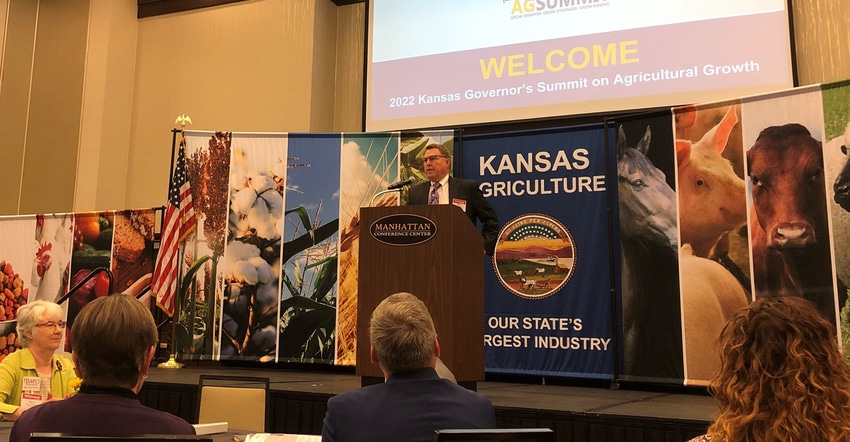
The Kansas agricultural and food sectors, combined with food retail and ethanol production, account for more than $75 billion, or 50% of the state’s economy, and employs more than 21% of the state’s workforce, according to the Kansas Department of Agriculture.
In 2021, Kansas exported a record-setting $5.35 billion in agricultural goods, the most in the state’s history, explained Kansas Gov. Laura Kelly as she opened the Kansas Governor’s Summit on Agricultural Growth Aug. 18. It is the lifeblood of Kansas, and the success of the Kansas economy and the success of Kansans rises and falls with the tides of the agricultural industry in the state, she added.
That’s why for seven years the KDA has hosted the summit in Manhattan, Kan. The summit brings together stakeholders, industry leaders, Kansas governmental entities, and Kansas State University Research and Extension to discuss the opportunities and challenges each sector faces, as well as ways that sectors can work together — and, most importantly, set a path forward for economic growth.
Commonalities
Across the sectors there are some commonalities. Among the challenges that the Kansas food and agriculture sectors face are:
Labor. From agricultural manufacturing to poultry, and in many sectors in between, workforce development and training were at the top of the list. Sectors are seeking partnerships with education in the state to train the next generation of skilled laborers on the farms and in the manufacturing plants. Additionally, the dairy, beef and poultry sectors in particular cite a lack of federal immigration reform as a key challenge to their sector expansions in the state.
Rural communities. It’s one thing to create an environment for business expansion, but it’s not very useful if rural communities aren’t attractive to future employees and their families. Several sectors identified rural housing, childcare and broadband internet infrastructure as a few critical pinch points that need to be addressed to make rural Kansas welcoming to the labor force needed for future expansions.
Water. The current drought had water at the top of mind for many stakeholders. Beef cattle feedyards and dairies out West, along with their neighbors raising the feed crops for their operations, are all concerned about conserving water for the future needs of their sectors.
Climate change research. Several sectors are trying to figure out what their role in mitigating climate change might be in the future. Whether it’s role of sorghum in water conservation or alfalfa’s carbon sequestration usefulness, many agree that supporting K-State Research and Extension’s work into carbon sequestration, water conservation, and technology can help them find opportunities in the future.
Next steps
The important part of the Ag Growth Summit is the chance for sectors stakeholders to network and collaborate on solutions to those commonalities.
“Many of the initiatives that we have seen realized in recent years were born at previous Kansas Ag Growth Summits,” said Mike Beam, Kansas secretary of agriculture. “As leaders from across all sectors of agriculture engage in active discussion about how we can move this industry forward, we know that collaboration benefits the entire state of Kansas.”
About the Author(s)
You May Also Like






